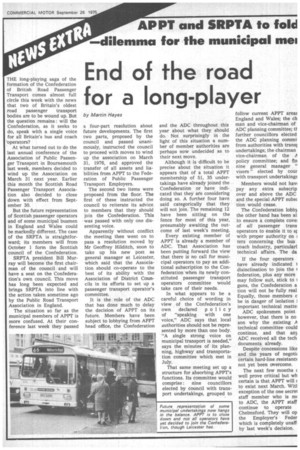End of the road for a long-player
Page 27

If you've noticed an error in this article please click here to report it so we can fix it.
by Martin Hayes
THE long-playing saga of the formation of the Confederation of British Road Passenger Transport comes almost full circle this week with the news that two c:4 Britain's oldest road passenger transport bodies are to be wound up. But the question remains : will the Confederation, as it seeks to do, speak with a single voice for all Britain's bus and coach 'operators?
At what turned out to do the last annual conference of the Association of Public Passenger Transport in Bournemouth last week, members decided to wind up the Association on March 31 next year. Earlier this month the Scottish Road Passenger Transport Association also decided to close down with effect from September 30.
But the future representation of Scottish passenger operators and of some municipal busmen in England and Wales could be markedly different. The case of the SRPTA is straightforward; its members will from October 1 form the Scottish council of the Confederation.
SRPTA president Bill Murray will become the first chairman of the council and will have a seat on the Confederation's own council. This move has long been expected and brings SRPTA into line with the action taken sometime ago by the Public Road Transport Association in England.
The situation so far as the municipal members of APPT is more confused. At their conference last week they passed a four-part resolution about future developments. The first two parts, proposed by the council and passed unanimously, instructed the council to proceed with moves to wind up the association on March 31, 1976, and approved the transfer of all assets and liabilities from APPT to the Federation of Public Passenger Transport Employers.
The second two items were proposed from the floor. The first of these instructed the council to reiterate its advice to members that they should join the Confederation. This was passed with only one dissenting voice.
Apparently without conflict the meeting then went on to pass a resolution moved by Mr Geoffrey Hilditch, soon to take up his new post as general manager at Leicester, which said that the Association should co-operate to the best of its ability with the Association of District Councils in its efforts to set up a passenger transport operator's committee.
It is the role of the ADC that has done much to delay the decision of APPT on its future. Members have been subject to lobbying from APPT head office, the Confederation and the ADC throughout this year about what they should do. Not surprisingly in the light of this situation a number of member authorities are perhaps now undecided as to their next move.
Although it is difficult to be precise about the situation it appears that of a total APPT membership of 51, 35 undertakings have already joined the Confederation or have indicated that they are considering doing so. A further four have said categorically that they will not join. The remaining 12 have been sitting on the fence for most of this year, presumably awaiting the outcome of last week's meeting.
Every existing member of APPT is already a member of ADC. That Association has been putting forward the view that there is no call for municipal operators to pay an additional subscription to the Confederation when its newly constituted passenger transport operators committee would take care of their needs.
In what appears to be a careful choice of wording in view of the Confederation's own declared polic y of "speaking with one voice," ADC says that local authorities should not be represented by more than one body. "A single strong voice on municipal transport is needed," says the minutes of its planning, highway and transportation committee which met in July.
That same meeting set up a structure for absorbing APPT's functions. Its committee would comprise : nine councillors elected by council with transport undertakings, grouped to follow current APPT areas England and Wales; the ch man and vice-chairman of ADC planning committee; tF further councillors elected the ADC planning commi from authorities with transj undertakings; the chairman vice-chairman of the A policy committee; and fin nine general manager " visers " elected by cour with transport undertakings Members would not hay' pay any extra subscrip over and above the ADC and the special APPT subs( tion would cease.
The Confederation lobby the other hand has been ai to ensure a complete cove' of all passenger trans operators to enable it to sr with proper authority on ters concerning the bus coach industry, particularl technical affairs. The da If the four operators have already indicated I disinclination to join the 1 federation, plus any more may follow suit, stick to 1 guns, the Confederation a tion will not be fully real Equally, those members c be in danger of isolation I important technical matte] ADC spokesmen point however, that there is no son why the existing A technical committee could continue, and that any ADC received all the tech documents already.
Despite concessions like and the years of negoth certain hard-line resistanct not yet been overcome.
The next few months well prove critical but win certain is that APPT will to exist next March. Witl exception of the one secre1 staff member who is mc to ADC, the APPT staff continue to operate Chelmsford. They will op the Employer's Feder which is completely unaft by last week's decision.




































































































